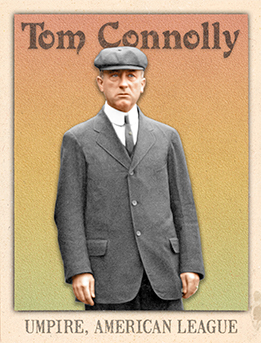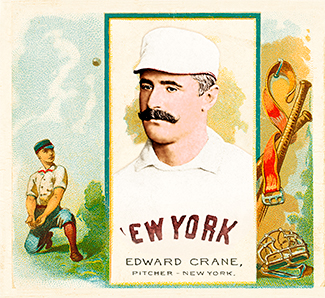
- Series: 1888 Champion New York Giants
- City: New York
- Team: Giants
- League: National League
Edward Nicholas Crane (1862-1896) began in major league ball with the notorious Boston Reds of the Union Association - a hard-drinking crew. It appears that big Ed avoided the bottle that would eventually kill him years later when he joined Al Spalding’s world exhibition tour. That he even made that trip was highly unlikely as Cannonball had labored in anonymity for years until the 1889 “World Series,” where Jim Mutrie played a hunch and decided his Giants could best the Bridegrooms with fastballs. Crane was tapped for five starts, won four and the Series. Cannonball could always throw hard and was famed for a 406’ long-toss, but such post-season heroics were virtually unheard of. The seeds of Ed’s doom had been planted on that tour, nourished by the vices of Paris. All too soon he would spiral into alcoholism and an early death. While the coroner ruled Crane's death an accidental overdose, rumors persisted that he had taken his own life by drinking acid.
- Ed had one of the great seasons of any pitcher for the Toronto Maple Leafs in ‘87 with 33 wins and an eye-popping .428 BA (when walks counted as hits)
- Other firsts: 1st NY Giant to hurl no-hitter; 1st pitcher with four Ks in an inning
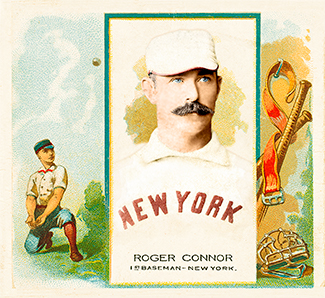
- Series: 1888 Champion New York Giants
- City: New York
- Team: Giants
- League: National League
- Hall: National Baseball Hall of Fame
Roger Connor (1857-1931) was the home run king of the 19th century, clouting 138 in his 18-year career. His record stood for 23 years after his retirement, until Babe Ruth surpassed him in 1921. Connor anchored first-base for five teams, winning pennants twice with the Giants. His flair for the dramatic was never more evident than when he struck the first-ever major league grand slam with his team down by three with two outs in the ninth. Born in Connecticut, Roger played for local clubs until joining the Troy Trojans in 1880. That NY hamlet witnessed five future Hall of Famers on their squad with Connor playing alongside Dan Brouthers, Buck Ewing, Tim Keefe and Mickey Welch. After moving to the Gothams, the 6’3” Connor inspired owner Jim Mutrie to proclaim the team “my giants!” and a new identity was born.
- Much more than a slugger, Connor won the NL batting title in 1885 and consistently hit .300+ while exhibiting remarkable speed for a big man (still fifth all-time in triples)
- Connor lived to see Ruth claim his HR title. It was thought at the time, however, that Connor had hit 131 HRS and Ruth's record was celebrated at 132. Writing for SABR in 1975, John tattersall discovered that Connor had actually hit 138 HRs.
- Jay Jaffe's JAWS system ranks Connor as the 5th greatest 1st baseman of all-time, just behind Cap Anson and just ahead of Jeff Bagwell
- Beloved by fans and the baseball press, he had a particularly strong advocate for the Hall in fellow legend, umpire Bill Klem
- Elected to Hall of Fame: 1976
- Series: Diamond Heads '15
- League: American League
- Hall: National Baseball Hall of Fame
Thomas Henry Connolly (1870-1961) was a young English immigrant who became so fascinated by the strange game of baseball that he resolved to learn as much as he could about it. He devoured the rule book, began umpiring in Massachusetts and was discovered by a big league ump. So began a half-century career ending with election to the Hall of Fame as one of the first two officials so honored (with Bill Klem).
- Found his niche in the American League, officiating its first game on April 24, 1901
- From 1931 to 1954 was AL supervisor of umpires, assuring integrity and consistency in the game he knew as well as any man
- Elected to Hall of Fame: 1953
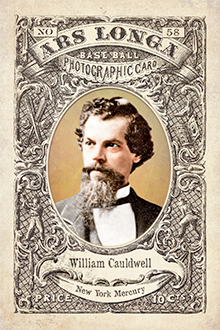
- Series: Pioneer Portraits I: 1850-1874
- City: New York
William Pierce Cauldwell (1824-1907) was, per the New York Tribune’s obituary, “the father of Sunday journalism.” More significantly for baseball, Cauldwell was the first publisher to dedicate regular space and ink to the game of baseball as news (starting in 1853), while also serving as mentor to the “Father of Baseball,” Henry Chadwick, whom he hired in 1858 to report on the new “national pastime” - a phrase Cauldwell’s Sunday Mercury newspaper coined on December 5, 1856.
Cauldwell had begun as a typesetter in 1841 before becoming publisher of the Sunday Mercury in NYC. In 1853 he began covering the games between the Knickerbockers and Gothams, introducing a wide audience to this phenomenon of outdoor athletics. He charted its course, reporting on the exponential growth of clubs all over the country. In his summary of the game in 1860, Cauldwell’s column no longer was long enough to list all the teams. He noted that California had seen its first game played on Feb 22 of that year.
- Cauldwell was active in politics, serving in the NY Senate and State Assembly as well as being a Supervisor of The Bronx before its annexation into NY City
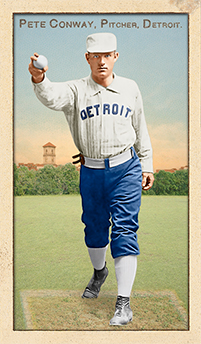
- Series: Beginnings: 1880's
- City: Detroit
- Team: Wolverines
- League: National League
Peter J. Conway (1866-1903) was a tough right-hander who played in tough luck with his early major-league clubs. Both the Buffalo Bisons and Kansas City Cowboys struggled to seventh-place finishes and failed to support their youngster during the 1885-86 seasons. He came into his own with a much better Detroit Wolverine squad for three years, helping the club win the pennant and post-season tourney in ‘87. Pete’s best year was in ‘88, going 30-14. The Wolverine franchise and Conway’s arm gave out. Pete went to the Alleghenys but got into only three games. Pressures were building that would culminate in the Players’ League “revolt” and the cavalier treatment Conway received in Pittsburgh was widely seen as all-too-typical. Pete tried unsuccessfully to play for Ward’s Wonders in 1890 but the arm was gone.
- In 1891 Conway was hired as the first head coach of the other Wolverines: those of the University of Michigan


